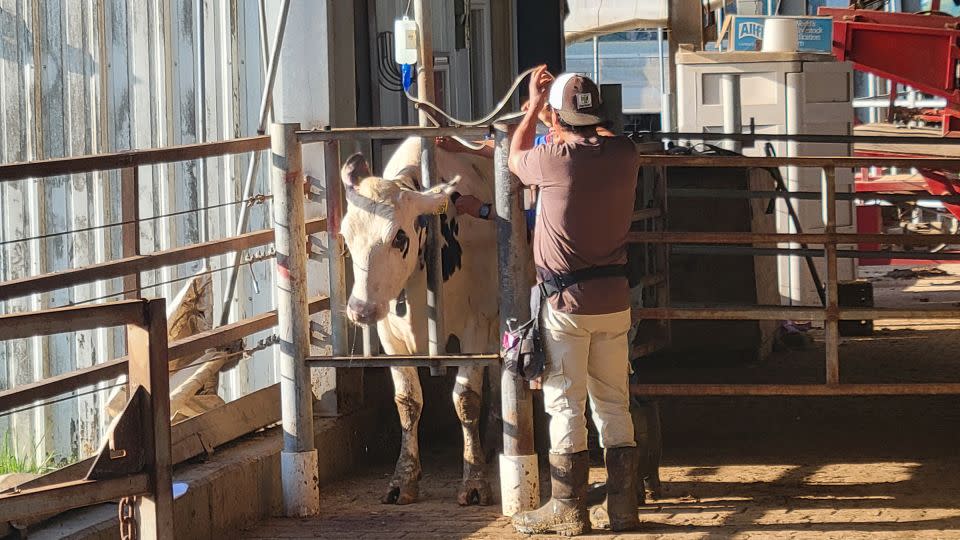Trump is pledging to deport millions. These employers are proposing a different solution
It can take months for Lisa Winton to find the skilled machinists she needs to build the equipment that fabricates tubes and coax cables for her customers. She knows there’s a bigger pool of experienced workers out there, but she can’t hire them because they are undocumented immigrants.
Winton, who co-founded and runs Winton Machine Company in Suwanee, Georgia, depends on immigrant workers – about a quarter of her 40 employees were not born in the US. Some have been in the country for many years, and all are authorized to work, she said, noting that she turns away applicants who ask to be paid off the books.
Unlike larger competitors, her company is too small to help promising candidates apply for work authorization, which puts her at a disadvantage.
That’s why Winton is among the hundreds of business leaders pushing the Biden administration to allow more undocumented immigrants who have been living in the US for years to work legally. Many of them already have jobs, are more connected to their communities and have a better command of English – making them more desirable employees than recent arrivals, she said.
“If you’re going to give all these people flowing over the border work permits, let’s focus on the people who’ve been here for a long time, paying into the system,” Winton said. “I need more legal people coming to me for jobs.”

Spearheaded by the American Business Immigration Coalition and joined by employers, federal lawmakers, local officials and advocates, the drive is asking President Joe Biden to provide work permits to more long-term undocumented residents, as he has done for certain migrant arrivals. The groups have held multiple news conferences and rallies over the past year to bring attention to the issue.
Employers have long sought to help fill their labor needs through immigration reform, but Congress remains gridlocked on the issue. The coalition argues Biden can do more through executive action under current law, including by expanding work permits to spouses of US citizens. Similar actions by Biden and former Presidents Donald Trump and Barack Obama, however, have spurred lawsuits.
The coming presidential election is adding urgency to the coalition’s plea. Trump recently told Time magazine that he plans to deport millions of undocumented people if he wins in November.
“President Trump will put America and the American worker first,” said Karoline Leavitt, a Trump campaign spokeswoman. “He will seal the border, stop the invasion and expand economic opportunity for American citizens, not illegal aliens.”
It’s a campaign promise that worries many employers who depend on immigrant workers.
With the election only months away, the Biden administration is discussing providing work permits to undocumented spouses of American citizens and legal residents, as well as to certain other immigrants who have lived in the US for many years, according to sources involved in the conversations.
Asked about the discussions, a White House spokesperson said that the administration is “constantly evaluating possible policy options.”
“The administration remains committed to ensuring those who are eligible for relief can receive it quickly and to building an immigration system that is fairer and more humane,” the spokesperson said in a statement to CNN.
Millions of undocumented workers
About 7.8 million unauthorized immigrants were in the labor force in 2021, up slightly from 2019, according to the Pew Research Center. They make up just under 5% of the workforce. Many use fake documents or are paid off the books.
Some industries employ a sizeable share of undocumented workers, though exact numbers are hard to come by.
About 40% of hired farm crop workers are not legally authorized to work, according to the Labor Department’s National Agricultural Workers Survey, though this could be a significant undercount. One in five undocumented workers are employed in a construction-related sector, according to a Center for American Progress report. A significant number of foreign workers in the dairy industry lack proper documentation, according to the National Milk Producers Federation.

Other immigrants have received work permits through various US Citizenship and Immigration Services programs, such as Temporary Protected Status, Deferred Action for Childhood Arrivals, or DACA, and Humanitarian Parole. Asylum-seekers can obtain work permits 180 days after they file for asylum. Mayors in several northern US cities, where migrants are arriving, have pushed the Biden administration to expedite the new arrivals’ work authorizations so they can get jobs and not rely on public assistance.
More than 2 million people have work authorization through these USCIS programs, though their status is fluid, according to Jessica Vaughan, director of policy studies at the Center for Immigration Studies, which advocates for lower immigration.
Expanding work authorization to more longtime immigrants will make it easier for businesses to fill job openings, as well as bring stability to those who may already employ undocumented workers, said Rebecca Shi, executive director of the American Business Immigration Coalition, which has 1,400 employers, associations and executives as members.
“Our employers started asking, ‘Hey, what about our existing employees? People that have been working on our farm, milking our cows at 3 a.m. for the last 20 years, or people that are designing semiconductors in these fabrication facilities and have very high skills,’” she said.
Nearly 80% of the nearly 11 million unauthorized immigrants in the US in 2022 entered before 2010, according to a recent report from the Department of Homeland Security.
With work permits, the immigrants will be able to get better jobs that pay more – resulting in a boost to federal, state and local tax revenue, Shi said.
While it’s easy to understand why both employers and undocumented workers would want to legalize the arrangement, expanding work authorization could hurt Americans, Vaughan said. Instead, she argued, it would be better to lure back the millions of people who have dropped out of the labor force.
“If we could tap this population, we could meet the needs of a lot of these employers,” she said. “Creating a situation where it’s easier for employers to bypass available US workers is going to create other social problems.”
Trump’s promise to deport millions
Trump has repeatedly said on the campaign trail that he would conduct “the largest domestic deportation operation in American history” if he is reelected. He made similar promises during his first run for the presidency.
During his first term, Trump undertook more than 400 executive actions on immigration, according to the Migration Policy Institute. His administration quadrupled the number of worksite investigations and broadened the types of immigrants subject to enforcement actions, including removal.
While arrests and deportations of immigrants living in the US increased, they remained “far short” of the levels seen under Trump’s predecessors, Tara Watson, an economics professor at Williams College, wrote in an EconoFact post in 2021.
“Relative to the late Bush and early Obama eras, the Trump administration removed a modest number of immigrants from the nation’s interior,” she wrote. “Instead, the administration increased the visibility and unpredictability of enforcement activity directed at unauthorized individuals living within the U.S. and expanded the use of detention as part of immigration enforcement.”
If Trump wins in November, his administration officials would likely be able to quickly ramp up detentions and deportations since they would have experience from his first term, said Kerri Talbot, executive director of the Immigration Hub, an advocacy group that works with Congress and the administration on a pro-immigrant agenda.
Trump’s first-term policies had an impact on businesses that rely on immigrant labor. For instance, it was harder for dairy farmers in Indiana to find workers during his first term, said Steve Obert, a fifth-generation farmer in the state and executive director of Indiana Dairy Producers. If Trump wins the 2024 election and carries out his promise, it will hurt farmers, deport taxpayers and break up families, he said.

All of Obert’s 15 non-family employees are foreign born and have work permits. But he knows that undocumented workers contribute a lot to the industry, as well as to the communities where they live. He’s advocating for allowing these folks to work legally so they can live without a cloud over them and so that dairy farmers can build experienced, stable workforces to care for their herds.
“You will absolutely cripple the dairy industry in this country if they send these workers back,” Obert said.
For more CNN news and newsletters create an account at CNN.com


